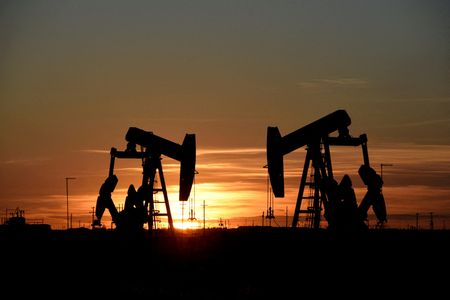 1
1 1
1
By Noah Browning
LONDON (Reuters) -Oil prices rose on Tuesday after China cut benchmark lending rates in a potential boost to growth but oil demand was seen rising less than expected this year, in a mixed picture for consumption by the world’s largest crude importer.
Brent crude was up 69 cents, or 0.9%, at $76.78 a barrel at 1226 GMT. U.S. West Texas Intermediate (WTI) crude for July was down 3 cents from Friday’s close at $71.75. The July contract expires at the end of trade on Tuesday.
The more active WTI crude contract for August delivery was up 10 cents from Friday at $72.03 per barrel. There was no settlement in the WTI contract on Monday due to a public holiday in the United States.
China on Tuesday cut two benchmark lending rates by 10 basis points each. The cuts, the first in 10 months, were less aggressive than some forecasts.
“Oil traders may need to see a materialised strong economic rebound in China to improve their outlook on oil demand,” said Tina Teng, a markets analyst at CMC Markets in Auckland.
The rate reductions follow recent economic data that showed China’s retail and factory sectors are struggling to sustain the momentum seen earlier this year.
While China’s 2023 crude oil demand is expected to rise 3.5% on last year, a researcher at China National Petroleum Corporation’s (CNPC) research arm said on Tuesday, down around 1% from a previous estimate in March.
Meanwhile China’s fuel oil imports eased slightly in May after hitting a decade-high in April.
The Chinese government met last week to discuss measures to spur growth in the economy, and several major banks have cut their 2023 economic growth forecasts for China amid concerns its post-COVID recovery is faltering.
Higher interest rates reduce appetite for spending and can drive down oil demand.
On the supply side, Iran’s crude exports and oil output have hit new highs in 2023 despite U.S. sanctions.
Russia is also set to increase seaborne diesel and gasoil exports this month, outweighing cuts by the Organization of the Petroleum Exporting Countries (OPEC) and its allies, including Moscow itself.
(Additional reporting by Katya Golubkova in Tokyo and Andrew Hayley in Beijing; editing by Kim Coghill, Jason Neely and Louise Heavens)